#Hulot's Holiday 1953 Tati
Text
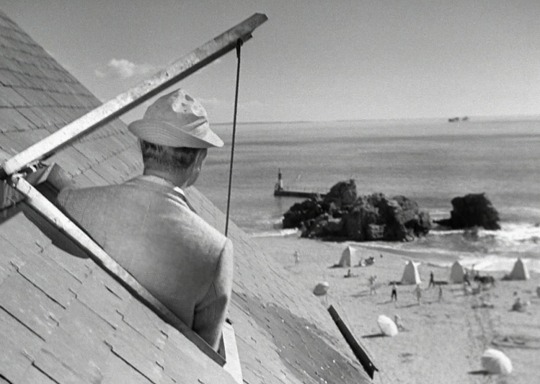
11 notes
·
View notes
Text
Lynch x Tati. TWIN PEAKS: FWWM (Lynch, 1992) x M. HULOT'S HOLIDAY (Tati, 1953), & TWIN PEAKS: THE RETURN (Lynch, 2017) x PLAYTIME (Tati, 1967)
David Lynch on Tati: "His comic genius is unsurpassed...But it is Jacques Tati's tender heart, at work in every frame, that makes us fall in love with his films. We feel so good to be alive after seeing [his] film[s]."
"Red pipes - from Jacques Tati's movie Mon Oncle. I just try and put them in my movies every now and then. I just love Jacques Tati." Below, Lynch's homage to Tati in MULHOLLAND DR. & WILD AT HEART:

Lynch: "I LOVE that guy. His whole style, & how he sees things. And again, you know, the guy's an inventor, visually, & w/ the sound, choreography, & music... Then there's his childlike love of his characters; I really dig it..."


#david lynch#jacques tati#mon oncle#les vacances de monsieur hulot#fire walk with me#twin peaks#twin peaks: the return
7 notes
·
View notes
Text
Top 100 Films
Just wanted to put this somewhere for the sake of documentation, might do this once a year to see how much the overall list changes.
Not ranked, but the list is done by release date, earliest to most recent. Includes short and feature length films (plus one TV series, and two serials, if you want to be specific):
• The Musketeers of Pig Alley (1912), dir. D.W. Griffith
• Fantômas (1913), dir. Louis Feuillade
• Les Vampires (1915), dir. Louis Feuillade
• The Doll (1919), dir. Ernst Lubitsch
• Foolish Wives (1922), dir. Erich von Stroheim
• Sherlock, Jr. (1924), dir. Buster Keaton
• Die Nibelungen: Kriemhild’s Revenge (1924), dir. Fritz Lang
• Greed (1924), dir. Erich von Stroheim
• The Last Laugh (1924), dir. F. W. Murnau
• The Gold Rush (1925), dir. Charlie Chaplin
• The General (1926), dir. Buster Keaton, Clyde Bruckman
• Sunrise: A Song of Two Humans (1927), dir. F. W. Murnau
• The Passion of Joan of Arc (1928), dir. Carl Theodor Dreyer
• The Docks of New York (1928), dir. Josef von Sternberg
• The Wedding March (1928), dir. Erich von Stroheim
• Man with a Movie Camera (1929), Dziga Vertov
• M (1931), dir. Fritz Lang
• Vampyr (1932), dir. Carl Theodor Dreyer
• I Am a Fugitive from a Chain Gang (1932), dir. Mervyn LeRoy
• Gold Diggers of 1933 (1933), dir. Mervyn LeRoy, Bubsy Berkeley
• L’Atalante (1934), dir. Jean Vigo
• The Scarlet Empress (1934), dir. Josef von Sternberg
• The Thin Man (1934), dir. W.S. Van Dyke
• The Only Son (1936), dir. Yasujirō Ozu
• Citizen Kane (1941), dir. Orson Welles
• Now, Voyager (1942), dir. Irving Rapper
• Meshes of the Afternoon (1943), dir. Maya Deren
• Day of Wrath (1943), dir. Carl Theodor Dreyer
• At Land (1944), dir. Maya Deren
• Ivan the Terrible, Part I (1944), dir. Sergei Eisenstein
• Notorious (1946), dir. Alfred Hitchcock
• Sunset Boulevard (1950), dir. Billy Wilder
• Monsieur Hulot’s Holiday (1953), dir. Jacques Tati
• The Wages of Fear (1953), dir. Henri-Georges Clouzot
• The Big Heat (1953), dir. Fritz Lang
• The Inauguration of the Pleasure Dome (1954), dir. Kenneth Anger
• Rear Window (1954), dir. Alfred Hitchcock
• Ordet (1955), dir. Carl Theodor Dreyer
• A Man Escaped (1956), dir. Robert Bresson
• Ivan the Terrible, Part II: The Boyars’ Plot (1958), dir. Sergei Eisenstein
• La Dolce Vita (1960), dir. Federico Fellini
• L’Avventura (1960), dir. Michelangelo Antonioni
• La Notte (1961), dir. Michelangelo Antonioni
• L’Eclisse (1962), dir. Michelangelo Antonioni
• The Exterminating Angel (1962), dir. Luis Buñuel
• Mothlight (1963), dir. Stan Brakhage
• Red Desert (1964), dir. Michelangelo Antonioni
• Gertrud (1964), dir. Carl Theodor Dreyer
• The War Game (1966), dir. Peter Watkins
• Au Hasard Balthazar (1966), dir. Robert Bresson
• Daisies (1966), dir. Věra Chytilová
• Lemon (1969), dir. Hollis Frampton
• The Conformist (1970), dir. Bernardo Bertolucci
• The Discreet Charm of the Bourgeoisie (1972), dir. Luis Buñuel
• F for Fake (1973), dir. Orson Welles
• Lancelot of the Lake (1974), dir. Robert Bresson
• A Woman Under the Influence (1974), dir. John Cassavetes
• The Texas Chain Saw Massacre (1974). dir. Tobe Hooper
• House (1977), dir. Nobuhiko Obayashi
• Stalker (1979), dir. Andrei Tarkovsky
• Nostalgia (1983), dir. Andrei Tarkovsky
• L’Argent (1983), dir. Robert Bresson
• Blue Velvet (1986), dir. David Lynch
• Heathers (1989), dir. Michael Lehmann
• Kiki’s Delivery Service (1989), dir. Hayao Miyazaki
• Baraka (1992), dir. Ron Fricke
• Satantango (1994), dir. Béla Tarr
• A Confucian Confusion (1994), dir. Edward Yang
• Chungking Express (1994), dir. Wong Kar-Wai
• Ed Wood (1994), dir. Tim Burton
• Whisper of the Heart (1995), dir. Yoshifumi Kondo
• Showgirls (1995), dir. Paul Verhoeven
• Neon Genesis Evangelion: The End of Evangelion (1997), dir. Hideaki Anno, Kazuya Tsurumaki
• Gummo (1997), dir. Harmony Korine
• The Big Lebowski (1998), dir. Joel Coen, Ethan Coen
• Outer Space (1999), dir. Peter Tscherkassky
• Beau Travail (1999), dir. Claire Denis
• Julien Donkey-Boy (1999), dir. Harmony Korine
• Yi Yi (2000), dir. Edward Yang
• Dancer in the Dark (2000), dir. Lars von Trier
• The Piano Teacher (2001), dir. Michael Haneke
• Mulholland Drive (2001), dir. David Lynch
• What Time Is It There? (2001), dir. Tsai Ming-liang
• Memories of Murder (2003), dir. Bong Joon-ho
• The Matrix Reloaded (2003), dir. Lily Wachowski, Lana Wachowski
• The Village (2004), dir. M. Night Shyamalan
• Caché (2005), dir. Michael Haneke
• Southland Tales (2006), dir. Richard Kelly
• Inland Empire (2006), dir. David Lynch
• Zodiac (2007), dir. David Fincher
• The White Ribbon (2009), dir. Michael Haneke
• The Turin Horse (2011), dir. Béla Tarr
• Five Broken Cameras (2012), dir. Emad Burnat, Guy Davidi
• The Master (2012), dir. Paul Thomas Anderson
• Spring Breakers (2012), dir. Harmony Korine
• Song to Song (2017), dir. Terrence Malick
• Twin Peaks: The Return (2017), dir. David Lynch
• The Favourite (2018), dir. Yorgos Lanthimos
• Portrait of a Lady on Fire (2019), dir. Céline Sciamma
• We’re All Going to the World’s Fair (2021), dir. Jane Schoenbrun
(10/4/23)
19 notes
·
View notes
Text

'Les Vacances de M. Hulot' (1953) Jacques Tati
#jacques tati #mr hulot #movie #cinema #saint marc sur mer #hotel de la plage #saint nazaire #loire atlantique #ocean #beach #vacances #summer holidays #days offf #jours-feries
2 notes
·
View notes
Text
In Praise of Ice-cream and Friendship
youtube
Out of nowhere, a small hand holding a note shows up. A second hand then joins the festivity to get the ice-cream cones from the kindest, quietest ice-cream seller in the world. And now the adventure of preserving those two jewels begins, step-by-step, walking up the stairway with the utmost care. Finally, there he is! At the door of the guest house where a friend is waiting to accompany him after this joyful triumph.
The simple but impressive background music, which helps to shape the whole sequence, cannot be taken for granted.
One cone for you, the other for me
keep my company in this glee
🎞film: Monsieur Hulot's Holiday (1953)
🎬director: Jacques Tati
🟣🟣🟣🟣⚪️
2 notes
·
View notes
Text

Jour de Fete (1949) was co-written and directed by, and stars Jacques Tati. Jacques was born in Le Pecq, France, and was Oscar nominated for his original screenplay for Mr Hulots Holiday (1953).
Jacques had eight director credits from a 1947 short to a 1978 documentary short. As an actor he had 15 credits from a 1932 short to a 1974 French tv movie.
5 notes
·
View notes
Text
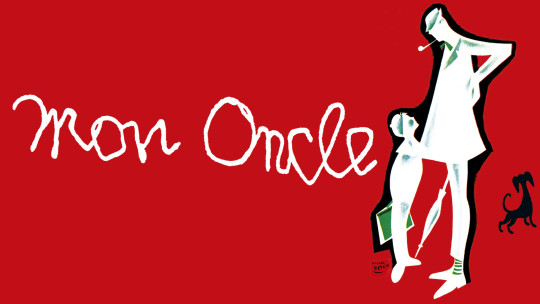
Traditions in transition: cinematic perspectives on the modernization of post-war societies (3/4)
The following article is the third in a four-part series looking at how cinema depicts post-war societies’ transformations, and more precisely the transition from a traditional society to a modern one. You can read each article separately, so there’s no need to worry if you haven’t read the previous one yet. Just know that if you are eager for more, you can find it HERE.
In order to examine our topic from all angles, every article of this series will be dedicated to a separate movie, each originating from a different country. Since context is essential to better understand what lies beneath images, and thus propose an in-depth analysis, I will always start by introducing the director and the significant historical events surrounding the films’ releases.
Part 3. My Uncle (Mon oncle, Jacques Tati, 1958)
Today, I deal with Jacques Tati’s comedy My Uncle (Mon oncle, 1958), which offers a satirical critique of the late 1950s societal transformations in France. A time marked by rapid modernization and economic growth, commonly referred to as the Trente Glorieuses (The Glorious Thirty). This period spanned from the aftermath of the Second World War to the 1973 oil crisis, and saw France transitioning from a war-torn country to one embracing new technologies and suburbanization.
youtube
My Uncle's Trailer
Jacques Tati, born Jacques Tatischeff in 1907, is a brilliant filmmaker, known for encapsulating in his work these mid-20th century profound changes and turning them into comical situations. By the time My Uncle was released, Tati had already made a significant mark with his previous films, particularly with his alter ego character Mr. Hulot.
After his first appearance in Monsieur Hulot’s Holiday (Les Vacances de Monsieur Hulot, 1953), Tati’s alter ego makes a major comeback in My Uncle. The film follows the adventures of the charming but bumbling Mr. Hulot, as he struggles to adapt to the modern and mechanized postwar world. My Uncle’s narrative unfolds through a series of sketches that juxtapose Hulot’s chaotic existence in his quirky neighborhood, and his visits to his sister Mrs. Arpel. The latter resides with her husband and her son in a sleek, ultra-modern house filled with ridiculous gadgets. His young nephew, Gérard, finds solace in Hulot’s eccentric company. In this way, Tati portrays Hulot as a relic of a disappearing world, endearing with his mannerisms that contrast sharply with Gérard’s parents' boring, sterile and unoriginal lifestyle.
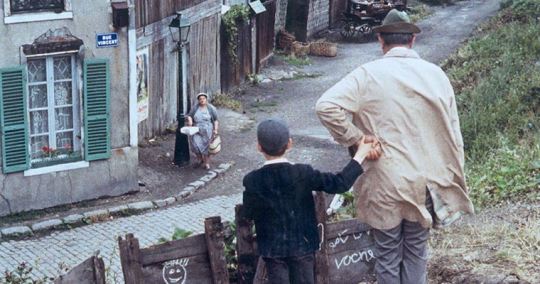

My Uncle, Jacques Tati, 1958
Tati’s genius lies in his ability to convey complex themes, through audio and visual elements rather than dialogue. One example of this is the exaggerated noises of Arpel family’s modern appliances contrasting with the natural sounds of Hulot’s neighborhood. The use of sound is not only for comic effects, it helps underscore the dissonance between the two worlds. Also, the Arpel family’s villa is a character in its own right and serves as a humorous critique of modern pretensions. Its stark, geometric architecture and automated gadgets symbolize the Glorious Thirty’s obsession with progress and efficiency.
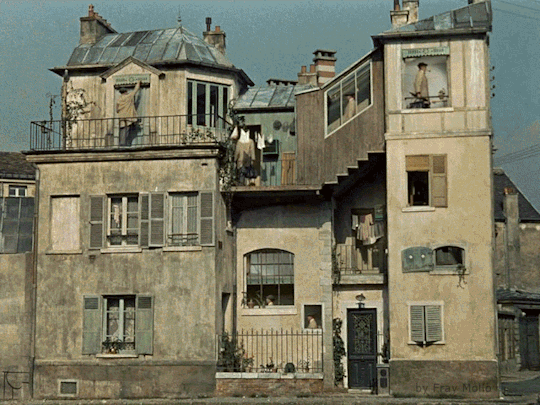
Mr. Hulot's neighborhood
The villa offers a wide range of comical possibilities. Scenes such as Hulot’s encounters with modern and automatic furniture are meticulously choreographed. Everyday actions are turned into derision, revealing the absurdity of excessive modernization.
My uncle was widely acclaimed, earning Tati the Academy Award for Best Foreign Language Film in 1959, thus solidifying his place in cinematic history. His next film, Playtime, explores further the absurdities of modern urban life, through the misadventures of Mr. Hulot in a hyper-organized, almost futuristic Paris.
Once again, thank you for your support. See you in June, for the last article of this series.
Ruth Sarfati
#Jacques Tati#Mon oncle#My Uncle#french cinema#post war#modernity#The Glorious Thirty#sound design#ruth sarfati
0 notes
Text
youtube
Monsieur Hulot's Holiday (1953)- Review - Monsieur Hulot (Jacques Tati) is on vacation at a beach resort when he finds himself creating a lot of unintentional chaos. Will he continue to bumble and fumble his way through his vacation while annoying the other guests? Or will he end up an enduring memory of a delightful time that was had by all? You'll have to tune in to find out!
#movie review#movies#film#cinema#french movie#french cinema#foreign film#jacques tati#vacation#beach#holiday#comedy#Youtube
0 notes
Photo
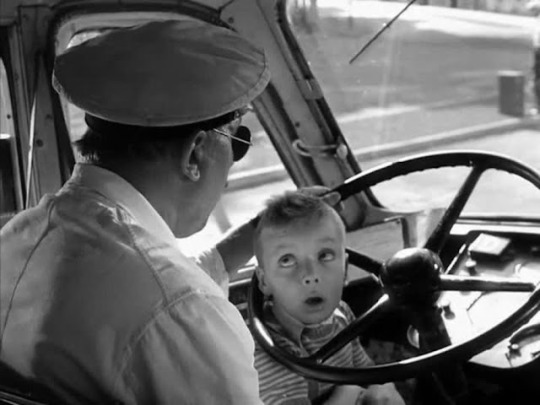
Monsieur Hulot's Holiday (Jacques Tati, 1953)
Cast: Jacques Tati, Natalie Pascaud, Micheline Rolla, Valentine Camax, Lucien Frégis, Raymond Carl. Screenplay: Pierre Aubert, Jacques Lagrange, Henri Marquet, Jacques Tati. Cinematography: Jacques Mercanton, Jean Mousselle. Music: Alain Romans
One of the delights of Monsieur Hulot's Holiday is that Hulot himself is part of an ensemble. It's not just a showcase for Jacques Tati's gifts as a physical comedian. While Hulot is the presumed focus of the movie, with his stiff-legged bouncing gait and his pipe-forward ambling, the world around him is as sweetly eccentric as he is. From the opening scenes with the holiday-bound crowds rushing from one railway platform to the other, confused by the comically garbled announcements, to the sardine-packed bus whose driver discovers a small boy thrusting his head up between the spokes of the steering wheel, Tati the director swiftly establishes the satiric thrust of the film: the bourgeoisie determined to have fun even if it kills them. Monsieur Hulot's Holiday is not gut-bustingly funny. Instead it's an assemblage of drolleries: slapstick moments like Hulot getting shut up in a folding canoe and being mistaken for a shark, mixed with smile-inducing bits like the strolling couple, she cheerfully leading him on excursions he clearly doesn't enjoy, as when she delightedly picks up shells, cooing over their beauty, which he tosses away once her back is turned. All of it is sweetened by a skillfully crafted soundtrack, from Hulot's wheezing and rattling auto to the irruptions of radio broadcasts in the hotel to the poink of the swinging door at the entrance to the dining room. I happen to think that the restored 114-minute version, assembled by Tati before his death, may be a bit too long, but there are many who can't get too much Hulot.
0 notes
Photo










Les vacances de Monsieur Hulot (Jacques Tati, 1953)
#Les vacances de Monsieur Hulot#Monsieur Hulot#Jacques Tati#Tati#black and white#1953#Les vacances de M. Hulot#Monsieur Hulot’s Holiday#comedy#Nathalie Pascaud#Micheline Rolla#Raymond Carl#beach#water#sea#animals#dogs#horses#cars#summer#boat#boats
347 notes
·
View notes
Photo










Les Vacances de Monsieur Hulot (Mr. Hulot’s Holiday)
Dir: Jacques Tati
1953
#jacques tati#mr hulot#monsieur hulot#mr hulots holiday#les vacances de monsieur hulot#france#1953#criterion collection
299 notes
·
View notes
Text
Monsieur Hulot’s Holiday (1953)
Charming film with humor, wry insight, and amusing observations and situations. But a bit frustrating as it's often just a little too vague; the gags aren't nailed down, crisp and precise, but meander in and out or are cut off, seemingly unfinished or underdeveloped. There are a few gags that feel whole and satisfying, but I think many of the bits could have been improved by allowing them to develop a bit longer. Still good; but there was the potential to be great.
Undoubtedly influential and I have no doubt that Steve Martin, Rowan Atkinson and Peter Sellers studied Jacques Tati's Hulot. I found it also a bit reminiscent of Hayao Miyazaki's gentle family films like My Neighbor Totoro.

Monsieur Hulot’s Holiday (1953)
Director: Jacques Tati
0 notes
Text
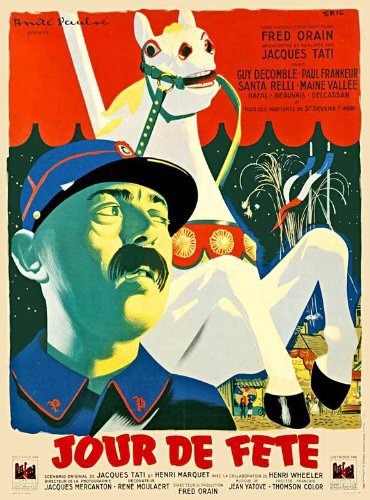
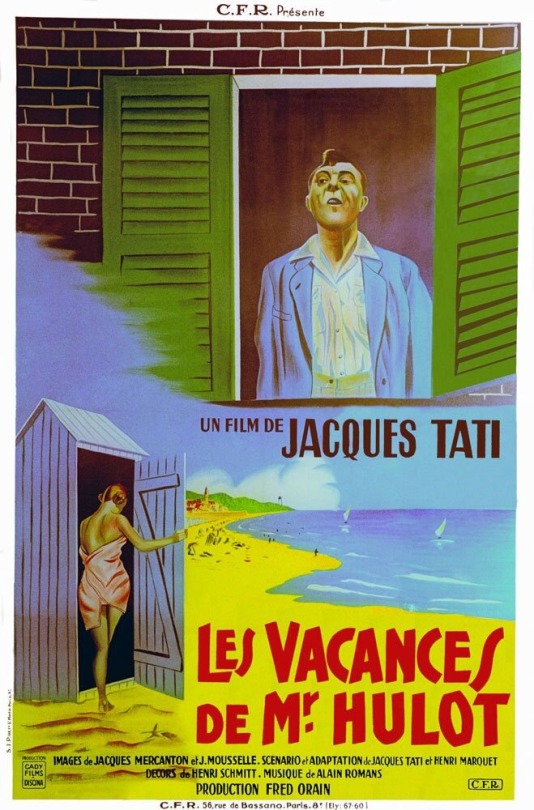

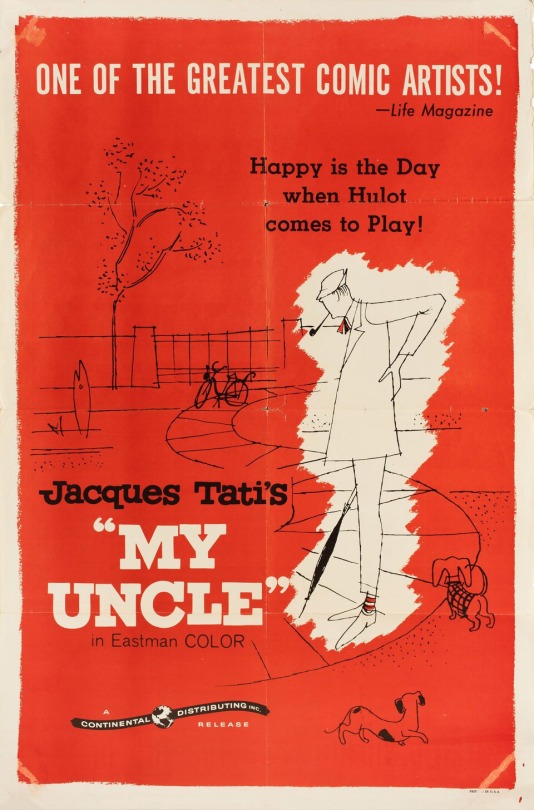
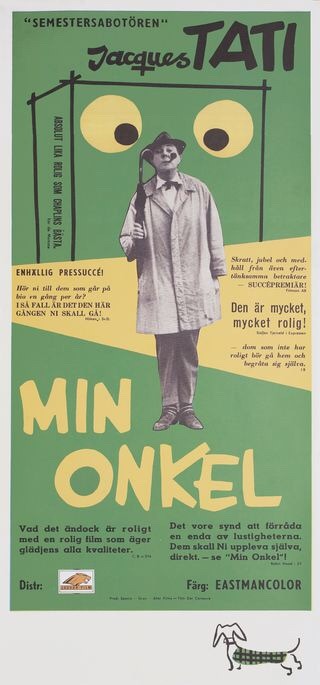

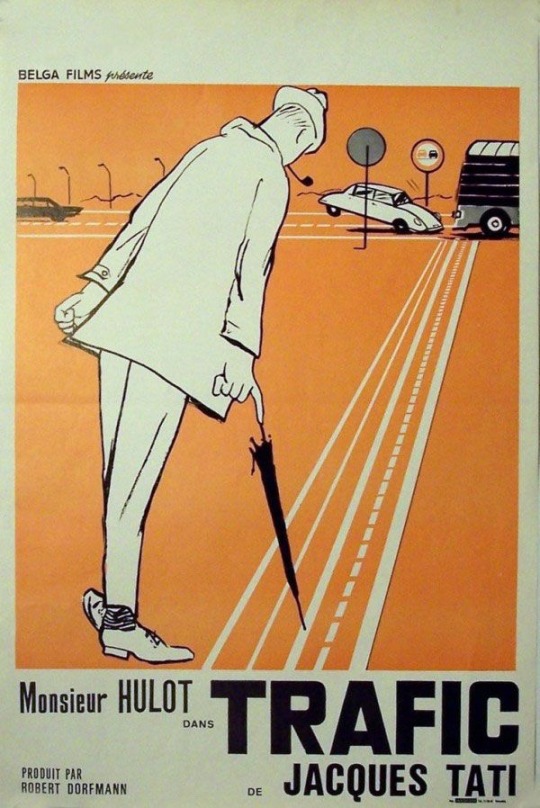


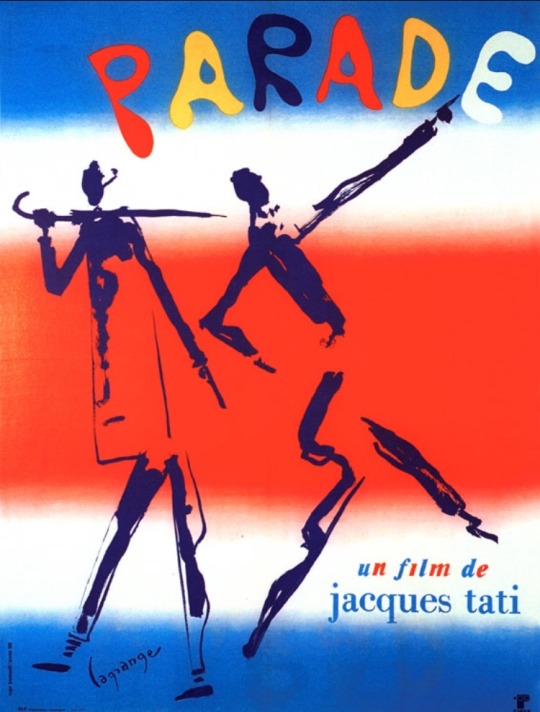
Les films de Jacques Tati
Jour de Fête (1949)
Monsieur Hulot’s Holiday (1953)
Mon Oncle (1958)
Playtime (1967)
Trafic (1971)
Parade (1974)
#jacques tati#les film de jacques tati#french cinema#movie directors#silent comedy#mr hulot#mon oncle#french directors
9 notes
·
View notes
Photo

Jacques Tati dans "Les Vacances de monsieur Hulot", 1953 #jacquestati #portrait #portraitphotography #portraitmood #portrait_vision #portraiture #photo #blackandwhite #blackanwhitephotography #bw #bnw #bnwphotography #bnwmood #bnw_greatshots #bwphotography #bnwcaptures #fun #funny #cinema #movie #movies #pipe #pipesmoker #pipesmoking #shadow #profile #hat #holidays https://www.instagram.com/p/CVDr1w1M52f/?utm_medium=tumblr
#jacquestati#portrait#portraitphotography#portraitmood#portrait_vision#portraiture#photo#blackandwhite#blackanwhitephotography#bw#bnw#bnwphotography#bnwmood#bnw_greatshots#bwphotography#bnwcaptures#fun#funny#cinema#movie#movies#pipe#pipesmoker#pipesmoking#shadow#profile#hat#holidays
5 notes
·
View notes
Photo

Monsieur Hulot’s Holiday
directed by Jacques Tati, 1953
#Monsieur Hulot's Holiday#Les Vacances de Monsieur Hulot#Les Vacances de M. Hulot#Jacques Tati#movie mosaics#Monsieur Hulot#Nathalie Pascaud#Lucien Frégis#Marguerite Gérard#René Lacourt
7 notes
·
View notes
Photo



Don’t you even know where the damn break is?
-It don’t work!
Monsieur Hulot's Holiday 1953 || dir. Jacques Tati //
Two for the Road 1967 || dir. Stanely Donen //
Paper Moon 1973 || dir. Peter Bogdanovich
#mr hulot's holiday#two for the road#paper moon#classicfilmblr#filmedit#userrobin#userlera#userel#smilecapsules#billhater#userkeanu#userivonne#myedits#tuserdaniela#userjl#userjulian#bbelcher#romulusnuffles#tusersoph#classic hollywood#movies#motionpicturesource
76 notes
·
View notes